Related Research Articles

The North Atlantic Treaty Organization, also called the North Atlantic Alliance, is an intergovernmental military alliance between 30 member states – 28 European and two North American. Established in the aftermath of World War II, the organization implemented the North Atlantic Treaty, signed in Washington, D.C., on 4 April 1949. NATO is a collective security system: its independent member states agree to defend each other against attacks by third parties. During the Cold War, NATO operated as a check on the perceived threat posed by the Soviet Union. The alliance remained in place after the dissolution of the Soviet Union and has been involved in military operations in the Balkans, the Middle East, South Asia, and Africa. The organization's motto is animus in consulendo liber.

The (International) Radiotelephony Spelling Alphabet, commonly known as the NATO phonetic alphabet, is the most widely used set of clear code words for communicating the letters of the Roman alphabet. Technically a radiotelephonic spelling alphabet, it goes by various names, including NATO spelling alphabet, ICAO phonetic alphabet and ICAO spelling alphabet. The ITU phonetic alphabet and figure code is a rarely used variant that differs in the code words for digits.

The Allied military phonetic spelling alphabets prescribed the words that are used to represent each letter of the alphabet, when spelling other words out loud, letter-by-letter, and how the spelling words should be pronounced for use by the Allies of World War II. They are not a "phonetic alphabet" in the sense in which that term is used in phonetics, i.e. they are not a system for transcribing speech sounds.
Surgeon general is a title used in several Commonwealth countries and most NATO nations to refer either to a senior military medical officer or to a senior uniformed physician commissioned by the government and entrusted with public health responsibilities. The title originated in the 17th century, as military units acquired their own physicians.
An enlisted rank is, in some armed services, any rank below that of a commissioned officer. The term can be inclusive of non-commissioned officers or warrant officers, except in United States military usage where warrant officers/chief warrant officers are a separate officer category ranking above enlisted grades and below commissioned officer grades. In most cases, enlisted service personnel perform jobs specific to their own occupational specialty, as opposed to the more generalized command responsibilities of commissioned officers. The term "enlistment" refers solely to a military commitment whereas the terms "taken on strength" and "struck off strength" refer to a service member being carried on a given unit's roll.

The Supreme Allied Commander Europe (SACEUR) is the commander of the North Atlantic Treaty Organization's (NATO) Allied Command Operations (ACO) and head of ACO's headquarters, Supreme Headquarters Allied Powers Europe (SHAPE). The commander is based at SHAPE in Casteau, Belgium. SACEUR is the second-highest military position within NATO, below only the Chair of the NATO Military Committee in terms of precedence.
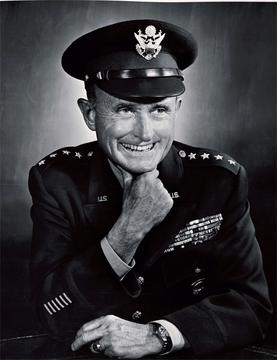
General Alfred Maximilian Gruenther was a senior United States Army officer, Red Cross president, and bridge player. After being commissioned towards the end of World War I, he served in the army throughout the interwar period and into World War II, where he was primarily a staff officer. Several years later, at the age of fifty-two, he became the second youngest four-star general in the history of the United States Army after Douglas MacArthur and succeeded General Matthew Ridgway as NATO's Supreme Allied Commander in Europe (SACEUR) serving from 1953 to 1956.
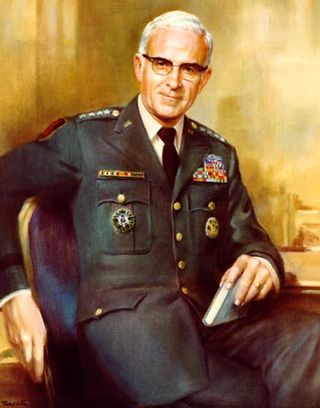
Bernard William Rogers was a United States Army general who served as the 28th Chief of Staff of the United States Army, and later as NATO's Supreme Allied Commander, Europe and Commander in Chief, United States European Command.
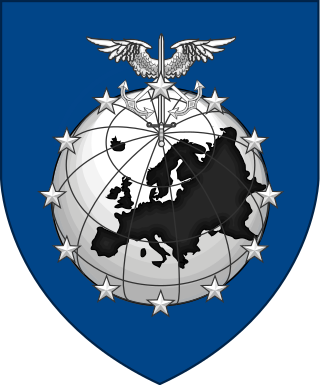
The Military Committee of the European Union (EUMC) is the body of the European Union's (EU) Common Security and Defence Policy that is composed of member states' Chiefs of Defence (CHOD). These national CHODs are regularly represented in the EUMC in Brussels by their permanent Military Representatives (MilRep), who often are two- or three-star flag officers.

Kurt Walter Tidd is a retired United States Navy admiral. He last served as the Commander, United States Southern Command. Prior to that assignment, Tidd served as Assistant to the Chairman of the Joint Chiefs of Staff. He also served as the Director for Operations, Joint Staff (J-3) from 2012 to 2013, and as Commander, United States Naval Forces Southern Command and United States Fourth Fleet from August 5, 2011 to June 22, 2012. Confirmed by the Senate on December 16, 2015, Tidd received his fourth star and succeeded John F. Kelly as commander of United States Southern Command on January 14, 2016. Tidd held the title of "Old salt", which means he received his qualification for Surface Warfare before any other active-duty navy officer. He passed said title to Admiral Philip S. Davidson upon his retirement. Upon the May 30, 2018, retirement of his United States Naval Academy classmate, Admiral Harry B. Harris Jr., Tidd also gained the honorific of "Old Goat" – the longest-serving Naval Academy graduate on active duty. Harris presented Tidd with the Old Goat decanter in a ceremony on April 11, 2018.

The Chair of the NATO Military Committee (CMC) is the head of the NATO Military Committee, which advises the North Atlantic Council (NAC) on military policy and strategy. The CMC is the senior military spokesperson of the 30-nation alliance and principal advisor to the Secretary General. The Chair is one of the foremost officials of NATO, next to the Secretary General and the Supreme Allied Commander Europe. The CMC is assisted by the Deputy Chair, who advises the Deputy Secretary General and serves as the principal agent for coordination of nuclear, biological, and chemical matters for the Military Committee. Originally titled the Chairman, the post was redesignated in 2021 to reflect the gender-neutrality of the post.
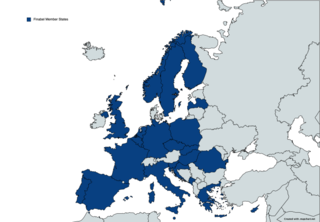
Finabel is a European organisation for the promotion of cooperation and interoperability between the national armies of the member states of the European Union (EU). Founded in 1953, Finabel is controlled by the chiefs of staff of its member states' armies, and the organisation's work agenda consists of studies and working groups. Finabel also has a relatively small permanent secretariat.

The chief of defence is the highest ranked commissioned officer of a nation's armed forces. The acronym CHOD is in common use within NATO and the European Union as a generic term for the highest national military position within the NATO and EU member states, rather than the actual term used for individual positions. Thus, irrespective of the formal national designation of that position is some variation on Commander-in-Chief, Chief of Staff, Supreme Commander or something else, they can all be referred to unambiguously as CHODs in NATO and EU terminology, although other terms are sometimes also seen within NATO. Thus, the Chairman of the Joint Chiefs of Staff is the CHOD of the United States, the Chief of the Defence Staff is the CHOD of United Kingdom, the Inspector General of the Bundeswehr is the CHOD of Germany and the Chief of Defence (Forsvarssjefen) is the CHOD of Norway.
The North Atlantic Treaty Organisation Military Committee is the body of NATO that is composed of member states' Chiefs of Defence (CHOD). These national CHODs are regularly represented in the MC by their permanent Military Representatives (MilRep), who often are two- or three-star flag officers. Like the Council, from time to time the Military Committee also meets at a higher level, namely at the level of Chiefs of Defence, the most senior military officer in each nation's armed forces.

The secretary general of NATO is the chief civil servant of the North Atlantic Treaty Organization (NATO). The officeholder is an international diplomat responsible for coordinating the workings of the alliance, leading NATO's international staff, chairing the meetings of the North Atlantic Council and most major committees of the alliance, with the notable exception of the NATO Military Committee, as well as acting as NATO's spokesperson. The secretary general does not have a military command role; political, military and strategic decisions ultimately rest with the member states. Together with the Chair of the NATO Military Committee and the supreme allied commander, the officeholder is one of the foremost officials of NATO.
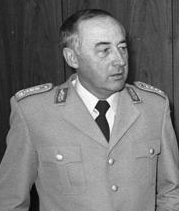
Wolfgang Altenburg was a German general. He served as Chief of Staff of the German armed forces, the Bundeswehr, from 1983 to 1986, and as Chairman of the NATO Military Committee from 1986 to 1989.
The Structure of the North Atlantic Treaty Organization is complex and multi-faceted. The decision-making body is the North Atlantic Council (NAC), and the member state representatives also sit on the Defence Policy and Planning Committee (DPPC) and the Nuclear Planning Group (NPG). Below that the Secretary General of NATO directs the civilian International Staff, that is divided into administrative divisions, offices and other organizations. Also responsible to the NAC, DPPC, and NPG are a host of committees that supervise the various NATO logistics and standardisation agencies.

The United States military representative to the NATO Military Committee (USMILREP) is the senior uniformed representative of the United States Armed Forces on the NATO Military Committee. The appointee, an officer of the United States Armed Forces at the rank of lieutenant general or vice admiral, represents the United States on the NATO Military Committee and is responsible for articulating and providing military advice to the Chair of the NATO Military Committee. The representative has a deputy who holds the one-star rank of brigadier general or rear admiral.
References
- ↑ Chairmen of the NATO Military Committee. NATO. Retrieved 19 December 2016.